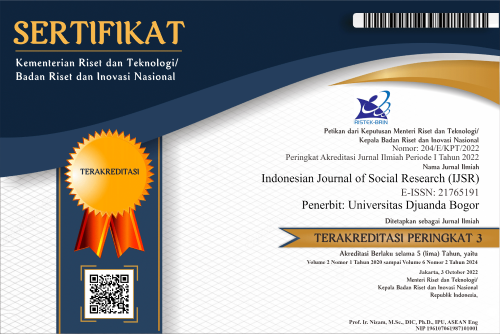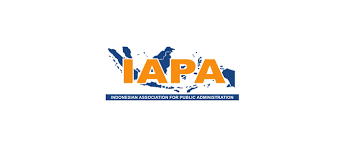Exploring Entrepreneurial Intentions among Vocational High School Graduates: The Impact of Entrepreneurial Knowledge and Attitude
Abstract
This research addresses the significant issue of unemployment among vocational school graduates in Indonesia and the low level of entrepreneurship among them. While previous studies have predominantly focused on the entrepreneurial intentions of high school and university student samples, there isthere needs to be more understanding of the entrepreneurial intentions of vocational school graduates. Bridging the gap, this study explores the determinants of entrepreneurial intentions among vocational school graduates, particularly examining the roles of entrepreneurial knowledge and attitude toward entrepreneurship. Additionally, this research explores attitude toward entrepreneurship as a mediating variable. The study employs a survey method with data from 305 vocational school graduates in Indonesia as participants. D ta analysis uses partial least squares structural equation modelling (PLS-SEM) with SmartPLS 4.0 software. The findings indicate that entrepreneurial Knowledge has a significant positive relationship with attitude toward entrepreneurship and entrepreneurial intention. Furthermore, this research finds that attitude toward entrepreneurship exhibits a complementary partial mediation effect between entrepreneurial Knowledge and entrepreneurial intention. The study also suggests that interest in entrepreneurship and professional experience can enhance the entrepreneurial intentions of vocational high school graduates. These insights offer valuable guidance for policymakers and educators in designing strategies to promote entrepreneurship among vocational school graduates, ultimately addressing unemployment challenges in Indonesia.
References
Ajzen, I. (1991). The theory of planned behavior. O ganizational Behavior and Human Decision Processes, 50(2), 179–211. https://doi.org/10.1016/0749-5978(91)90020-t
Ajzen, I. (2005). Attitudes, Personality And Behavior second., Buckingham.
Ajzen, I. (2020). The theory of planned behavior: Frequently asked questions. H man Behavior and Emerging Technologies, 2(4), 314–324. https://doi.org/10.1002/hbe2.195
Bakrun, M., Khurniawan, A. W., Widjajanti, C., Razik, A. L., Adi, F. P., Majid, M. A., & Syafaa, A. R. (2019). Vocational education policy white paper vol. 1 nomor 9 tahun 2019: Profil lulusan SMK terhadap tingkat penyerapan tenaga kerja di Indonesia tahun 2018-2019.
Bandura, A. (1989). Human agency in social cognitive theory. A erican Psychologist, 44(9), 1175.
Bird, B. (1988). Implementing entrepreneurial ideas: The case for intention. A ademy of Management Review, 13(3), 442–453. https://doi.org/10.5465/amr.1988.4306970
BPS. (2023). Tabel Dinamis Subjek Tenaga Kerja: Tingkat Pengangguran Terbuka Berdasarkan Tingkat Pendidikan. Badan Pusat Statistik. https://www.bps.go.id/subject/6/tenaga-kerja.html#subjekViewTab5
Brislin, R. W. (1970). Back-translation for cross-cultural research. J urnal of Cross-Cultural Psychology, 1(3), 185–216. https://doi.org/10.1177/135910457000100301
Cantù, C. (2017). Entrepreneurial knowledge spillovers: Discovering opportunities through understanding mediated spatial relationships. I dustrial Marketing Management, 61, 30–42. https://doi.org/10.1016/j.indmarman.2016.07.002
Collier, J. (2020). Applied structural equation modeling using AMOS: Basic to advanced techniques. Routledge. https://doi.org/10.4324/9781003018414
Conner, M., & Armitage, C. J. (1998). Extending the theory of planned behavior: A review and avenues for further research. J urnal of Applied Social Psychology, 28(15), 1429–1464. https://doi.org/10.1111/j.1559-1816.1998.tb01685.x
Dirjen Pendidikan Vokasi. (2022). Peraturan Direktur Jenderal Pendidikan Vokasi Nomor 34 Tahun 2022 Tentang Petunjuk Teknis Bantuan Pemerintah Program Pendidikan Kecakapan Wirausaha Tahun 2023. Sekretariat Direktorat Jenderal Pendidikan Vokasi.
Doanh, D. C., & Bernat, T. (2019). Entrepreneurial self-efficacy and intention among Vietnamese students: A meta-analytic path analysis based on the theory of planned behavior. Procedia Computer Science, 159, 2447–2460. https://doi.org/10.1016/j.procs.2019.09.420
Entrialgo, M., & Iglesias, V. (2016). The moderating role of entrepreneurship education on the antecedents of entrepreneurial intention. I ternational Entrepreneurship and Management Journal, 12(4), 1209–1232. h tps://doi.org/10.1007/s11365-016-0389-4
Esfandiar, K., Sharifi-Tehrani, M., Pratt, S., & Altinay, L. (2019). Understanding entrepreneurial intentions: A developed integrated structural model approach. Journal of Business Research, 94, 172–182. https://doi.org/10.1016/j.jbusres.2017.10.045
Failla, V., Melillo, F., & Reichstein, T. (2017). Entrepreneurship and employment stability—Job matching, labour market value, and personal commitment. Journal of Business Venturing, 32(2), 162–177. h tps://doi.org/10.1016/j.jbusvent.2017.01.002
Fishbein, M., & Ajzen, I. (2011). Predicting and changing behavior: The reasoned action approach. Pychology press. https://doi.org/10.4324/9780203838020
Hair, J., & Alamer, A. (2022). Partial Least Squares Structural Equation Modeling (PLS-SEM) in second language and education research: Guidelines using an applied example. R search Methods in Applied Linguistics, 1(3), 100027. https://doi.org/10.1016/j.rmal.2022.100027
Johannisson, B. (1991). University training for entrepreneurship: Swedish approaches. E trepreneurship & Regional Development, 3(1), 67–82. https://doi.org/10.1080/08985629100000005
Kibler, E. (2013). Formation of entrepreneurial intentions in a regional context. E trepreneurship & Regional Development, 25(3–4), 293–323. https://doi.org/10.1080/08985626.2012.721008
Krueger Jr, N. F., Reilly, M. D., & Carsrud, A. L. (2000). Competing models of entrepreneurial intentions. J urnal of Business Venturing, 15(5–6), 411–432. https://doi.org/10.1016/s0883-9026(98)00033-0
Krueger, N. F., & Carsrud, A. L. (1993). Entrepreneurial intentions: Applying the theory of planned behaviour. E trepreneurship & Regional Development, 5(4), 315–330. https://doi.org/10.1080/08985629300000020
Liao, Y.-K., Nguyen, V. H. A., & Caputo, A. (2022). Unveiling the role of entrepreneurial Knowledge and cognition as antecedents of entrepreneurial intention: A meta-analytic study. I ternational Entrepreneurship and Management Journal, 18(4), 1623–1652. h tps://doi.org/10.1007/s11365-022-00803-8
Liñán, F. (2004). Intention-based models of entrepreneurship education. Piccolla Impresa/Small Business, 3(1), 11–35.
Liñán, F., & Chen, Y. (2009). Development and cross–cultural application of a specific instrument to measure entrepreneurial intentions. E trepreneurship Theory and Practice, 33(3), 593–617. https://doi.org/10.1111/j.1540-6520.2009.00318.x
Liñán, F., & Fayolle, A. (2015). A systematic literature review on entrepreneurial intentions: Citation, thematic analyses, and research agenda. I ternational Entrepreneurship and Management Journal, 11, 907–933. https://doi.org/10.1007/s11365-015-0356-5
Liñán, F., Rodríguez-Cohard, J. C., & Rueda-Cantuche, J. M. (2011). Factors affecting entrepreneurial intention levels: A role for education. International Entrepreneurship and Management Journal, 7, 195–218. https://doi.org/10.1007/s11365-010-0154-z
Lortie, J., & Castogiovanni, G. (2015). The theory of planned behavior in entrepreneurship research: What we know and future directions. International Entrepreneurship and Management Journal, 11, 935–957. https://doi.org/10.1007/s11365-015-0358-3
Malebana, M. J., & Mothibi, N. H. (2023). Relationship between prior entrepreneurship exposure and entrepreneurial intention among secondary school learners in Gauteng, South Africa. Journal of Innovation and Entrepreneurship, 12(1), 43. h tps://doi.org/10.1186/s13731-023-00309-9
Maulida, F. H., Noviani, L., & Sudarno, S. (2024). How Entrepreneurship Education Can Help Student Thrive in the Digital Age? : The Implications of Creative and Innovative Learning. Jurnal Kependidikan: Jurnal Hasil Penelitian Dan Kajian Kepustakaan Di Bidang Pendidikan, Pengajaran Dan Pembelajaran, 10(1), 218. https://doi.org/10.33394/jk.v10i1.10815
Miralles, F., Giones, F., & Riverola, C. (2016). Evaluating the impact of prior experience in entrepreneurial intention. International Entrepreneurship and Management Journal, 12, 791–813. https://doi.org/10.1007/s11365-015-0365-4
Nitzl, C. (2016). The use of partial least squares structural equation modelling (PLS-SEM) in management accounting research: Directions for future theory development. Journal of Accounting Literature, 37(1), 19–35. h tps://doi.org/10.1016/j.acclit.2016.09.003
Noviani, L., Wahida, A., & Umiatsih, S. T. (2022). STRATEGI IMPLEMENTASI PROYEK KEWIRAUSAHAAN DI SMA NEGERI 1 SUMBERLAWANG. Jurnal Kewirausahaan dan Bisnis, 27(1), 60. https://doi.org/10.20961/jkb.v27i1.58934
Pigozne, T., Luka, I., & Surikova, S. (2019). Promoting Youth Entrepreneurship and Employability through Non-Formal and Informal Learning: The Latvia Case. Center for Educational Policy Studies Journal, 9(4), 129–150. h tps://doi.org/10.26529/cepsj.303
Politis, D., & Gabrielsson, J. (2009). Entrepreneurs’ attitudes towards failure: An experiential learning approach. International Journal of Entrepreneurial Behavior & Research, 15(4), 364–383. https://doi.org/10.1108/13552550910967921
Pratana, N. K., & Margunani, M. (2019). Pengaruh sikap berwirausaha, norma subjektif dan pendidikan kewirausahaan terhadap intensi berwirausaha. Economic Education Analysis Journal, 8(2), 533–550.
Republik Indonesia. ( 022). Peraturan Presiden Republik Indonesia Nomor 2 Tahun 2022 tentang Pengembangan Kewirausahaan Nasional Tahun 2021 -2024. In Lembaran Negara Republik Indonesia Tahun 2022 Nomor 3. Kementerian Sekretariat Negara.
Ringle, C. M., & Sarstedt, M. (2016). Gain more insight from your PLS-SEM results. I dustrial Management & Data Systems, 116(9), 1865–1886. h tps://doi.org/10.1108/IMDS-10-2015-0449. https://doi.org/10.1108/imds-10-2015-0449
Roxas, B. (2014). Effects of entrepreneurial Knowledge on entrepreneurial intentions: A longitudinal study of selected South-east Asian business students. J urnal of Education and Work, 27(4), 432–453. https://doi.org/10.1080/13639080.2012.760191
Saptono, A., Wibowo, A., Narmaditya, B. S., Kusumojanto, D. D., & Hermawati, M. (2019). Determinant Factors of Development Entrepreneurial Education: Lesson from Senior High School in Indonesia. U iversal Journal of Educational Research, 7(12), 2837–2843. h tps://doi.org/10.13189/ujer.2019.071234
Schjoedt, L., & Shaver, K. G. (2007). Deciding on an Entrepreneurial Career: A Test of the Pull and Push Hypotheses Using the Panel Study of Entrepreneurial Dynamics Data. En TREPRENEURSHIP THEORY and PRACTICE. https://doi.org/10.1111/j.1540-6520.2007.00197.x
Shan, B., & Lu, X. (2020). Founders social ties, learning and entrepreneurial knowledge acquisition in China. I Guanxi in Contemporary Chinese Business (pp. 101–121). R utledge. https://doi.org/10.4324/9781003124856-8
Shmueli, G. (2010). The Explain or to Predict? Statistical Science, 25(3). h tps://doi.org/10.1214/10-STS330
Skrzeszewski, S. (2006). The knowledge entrepreneur. S arecrow Press Lanham, MD. https://doi.org/10.1086/523922
Syam, A., Rakib, M., Jufri, M., Utami, N. F., & Sudarmi, S. (2021). Entrepreneurship education, information literacy, and entrepreneurial interests: An empirical study. Ac ademy of Entrepreneurship Journal, 27(1), 1–11.
Trading Economics. (2023). Tingkat Pengangguran - Daftar Negara - Asia. Tingkat Pengangguran-Asia. https://id.tradingeconomics.com/country-list/unemployment-rate?continent=asia
Unger, J. M., Rauch, A., Frese, M., & Rosenbusch, N. (2011). Human capital and entrepreneurial success: A meta-analytical review. Journal of Business Venturing, 26(3), 341–358. https://doi.org/10.1016/j.jbusvent.2009.09.004
Yuan, L., Qalati, S., Iqbal, S., Hussain, R., & Ali, S. (2019). Impact of prior work experience on entrepreneurial intention and theory of planned behaviour in the context of Pakistan. J Entrep Organ Manag, 8, 268.
Zhan, Q., Li, G., & Zhan, W. (2023). Measurement of the coupling coordination relationship between the structures of secondary vocational school programs and industries in China. H manities and Social Sciences Communications, 10(1), 1–10.
Copyright (c) 2024 Indonesian Journal of Social Research (IJSR)

This work is licensed under a Creative Commons Attribution-ShareAlike 4.0 International License.
The Authors submitting a manuscript do so on the understanding that if accepted for publication, copyright publishing of the article shall be assigned/transferred to Indonesian Journal of Social Research (IJSR) Universitas Djuanda as Publisher of the journal. Upon acceptance of an article, authors will be asked to complete a 'Copyright Transfer Agreement'. An e-mail will be sent to the corresponding author confirming receipt of the manuscript together with a 'Copyright Transfer Agreement' form by online version of this agreement.
Indonesian Journal of Social Research (IJSR) Universitas Djuanda, the Editors and the Editorial Board make every effort to ensure that no wrong or misleading data, opinions or statements be published in the journal. In any way, the contents of the articles and advertisements published in the Indonesian Journal of Social Research (IJSR) Universitas Djuanda are sole and exclusive responsibility of their respective authors and advertisers.
Remember, even though we ask for a transfer of copyright, our journal authors retain (or are granted back) significant scholarly rights as mention before.
The Copyright Transfer Agreement (CTA) Form can be downloaded here: Copyright Transfer Agreement-IJSR 2020
The copyright form should be signed electronically and send to the Editorial Office e-mail below:
Dr. Rasmitadila, M.Pd (Editor-in-Chief)
Universitas Djuanda
Jl. Tol Jagorawi No.1, Ciawi, Kec. Ciawi, Bogor, Jawa Barat 16720
Website: http://journal.unida.ac.id/index.php/IJSR/index
Email: ijsr@unida.ac.id





4.png)



